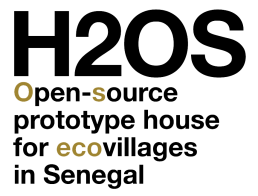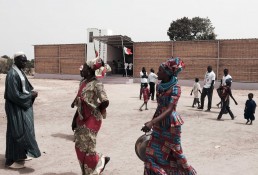H2OS inauguration, anti-desertification eco-village in Senegal
H2OS is an eco-village project in Africa. Against desertification, school dropouts, emigration. It will be open-source, autonomous and sustainable.
TAMssociati: ‘a model for the whole continent’.
TAMssociati has inaugurated the ‘eco-maison’, the first lot of the H2OS project, which plans construction of an eco-village in Senegal (at Keur Bakar, 200 km from Dakar) consisting of common spaces and housing modules self-supporting in energy and water in an area where desertification is inexorably spreading.
“Desertification, high dropout rates at school, emigration: H2OS is a project that aims to give hope to all the peoples of the African Sahel,” announce TAMassociati. It is an open-source pilot project, replicable, adaptable and perfectible elsewhere. It is the result of an international collaboration, born from the grass roots and inspired by Sunugal – an association of Senegalese immigrants in Italy – which has won increasing support. And it is destined to become a model of sustainable dwelling for the whole continent, but can be adapted anywhere“
The eco-village will become a symbol of eco-modernity, proportioned to the technical, managerial, and agricultural self-sufficiency of local communities, who are also the protagonists of this project .
The eco-dwellings, organized around the common eco-home technology, will be built of stabilized raw-earth bricks in a self-build system. The most complex elements of the buildings (extremities, services, utilities) are dealt with by specialized technicians who at the same time train the local workforce.
On-site maintenance is part of a broader scenario of self-sufficiency and self-subsistence underlying the project. Sustainability is also embodied in the cost of the work: below 200 euros per metre.
The village is located in an area without electricity, water or school and health services.
The eco-maison project completes the first phase of the project: “The community eco-maison, the heart of the new village,” state TAMssociati “will be a home for the community devoted to research, training, information, arts and crafts workshops, and social life. A public place of sharing, in which the first cornerstones of the ecological project will be shaped: from the recovery of rainwater for sanitary water to systems engineering, the filtration system and natural ventilation, passive building, energy production, phytodepuration of black waters and the photovoltaic circuit.
“Next to it are the well, washhouse and a community organic vegetable garden, run largely by women and irrigated by the water recovery system: a true community garden, where farming rests on the principles of environmental compatibility, food and local culture”.
The challenge to designers, promoters and partners is clear: the Senegalese project, an African path to ecology, is a new proposal for the new type of modernity required by the continent, concerned to combine self-management, traditions, landscape and social fabric with the opportunities offered by the best international design.
“A non-invasive but participatory design, which will become a bulwark and symbol of rights,” conclude TAMssociati, “such as access to water, food, the possibility of living in the place where they were born and moving away voluntarily, not from necessity.”
—
The H2OS architectural and technological project is conceived and developed by TAMssociati .
It is an experiment in co-development promoted by the Circolo Sunugal (Senegalese Migrant Association) in Venice, developed by Onlus Musoco (Venice) in collaboration with the NGO USE (Union pour Solidarité et l’Entraide) in Dakar. It is funded by CGIL CAAF Nord-Est, 8 per mille Chiesa Valdese, LTA (Livenza Tagliamento Acque), and is supported by AUTODESK FOUNDATION (USA). H2OS is also supported by IdRiCo (Idee per Risorse Collettive), funded by the Friuli Venezia Giulia Region, and by the provincial association Arci Trieste.

